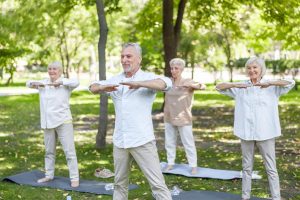Improve the Mental, Physical, and Emotional Well-Being of Older Adults During Covid-19 Pandemic with Tai Chi
By John M. de Castro, Ph.D.
“Tai Chi Chuan has a potential effect on the prevention, treatment and rehabilitation of COVID-19. Its potential mechanisms include reducing anxiety, relieving depression and stress, enhancing pulmonary and cardiovascular function, enhancing immunity and improving quality of life.” – Chen Xianjian
The COVID-19 pandemic has challenged the mental and physical health of the population. It has created intense stress on everyone but particularly the elderly isolating at home. Mindfulness is known to decrease the psychological and physical responses to stress. So, mindfulness training may be helpful in coping with the mental and physical challenges resulting from the COVID-19 pandemic. Tai Chi and Qigong are both mindfulness practices and gentle exercises. They have been shown to be beneficial for the health and well-being of individuals of a variety of ages, but particularly the elderly. So, it would seem reasonable to examine the ability of Tai Chi practice to improve the well-being of older adults during the Covid-19 pandemic.
In today’s Research News article “Tai chi improves psychoemotional state, cognition, and motor learning in older adults during the COVID-19 pandemic.” (See summary below or view the full text of the study at: https://www.ncbi.nlm.nih.gov/pmc/articles/PMC8054611/ ) Solianik and colleagues recruited healthy sedentary older adults (over 60 years of age) during the Covid-19 pandemic and randomly assigned them to 10 weeks of twice a week for 60 minute Tai Chi practice or to a no treatment control condition. They were measured before and after training for heart rate, perceived stress, anxiety, depression cognitive performance, and motor performance. In addition, blood was drawn and assayed for brain-derived neurotrophic factor.
They found that in comparison to baseline and the control group, the older adults who practiced Tai Chi had significantly higher levels of brain-derived neurotrophic factor, high frequency power in the heart rate, visuospatial performance, response inhibition, and shifting mental set, and significantly lower reaction times, heart rate, perceived stress, and depression.
The results must be interpreted with the understanding that the control condition was no treatment in a sedentary group of older adults. So, it cannot be determined if the effects were due to Tai Chi itself or exercise in general. Nevertheless, Tai Chi practice resulted in significant improvements in cardiovascular fitness, brain development, cognitive performance, and psychological health.
Tai Chi practice is not strenuous, involves slow gentle movements, and is safe, having no appreciable side effects, it is appropriate the elderly. It can also be practiced without professional supervision and in groups making it inexpensive to deliver and fun to engage in. This suggests that during stressful times Tai Chi should be recommended for older adults for their mental, physical, and emotional well-being.
So, improve the mental, physical, and emotional well-being of older adults during Covid-19 pandemic with Tai Chi.
“Older people should exercise for the entire duration of self-isolation. One large systematic review of falls prevention exercises emphasised the importance of maintaining exercise over time – benefits from Tai Chi were found after 20 weeks.” – Jamie Hartmann-Boyce
CMCS – Center for Mindfulness and Contemplative Studies
This and other Contemplative Studies posts are also available on Google+ https://plus.google.com/106784388191201299496/posts and on Twitter @MindfulResearch
Study Summary
Solianik, R., Mickevičienė, D., Žlibinaitė, L., & Čekanauskaitė, A. (2021). Tai chi improves psychoemotional state, cognition, and motor learning in older adults during the COVID-19 pandemic. Experimental gerontology, 150, 111363. https://doi.org/10.1016/j.exger.2021.111363
Abstract
The aim of this study was to determine the effect of a 10-week tai chi intervention on psychoemotional state, cognition, and motor learning in older adults during the COVID-19 pandemic. Participants aged 60–78 years were randomized to either a control group (n = 15) or a tai chi group (n = 15) for a 10-week period. The tai chi group received two, 8-form tai chi classes of 60 min duration per week. Changes in psychoemotional state, cognition, and the learning of fast and accurate reaching movements were assessed. In addition, the potential roles of the autonomic nervous system and brain-derived neurotrophic factor (BDNF) were investigated. Tai chi practice decreased (P < 0.05) perceived stress, whereas no change in autonomic nervous system activity was observed. Improvements in mental switching correlated with decreased depressive symptoms and increased BDNF levels (P < 0.05), whereas improvements in inhibitory control tended to correlate with BDNF levels (P = 0.08). Improvements in visuospatial processing tended to correlate with decreased depressive symptoms (P = 0.07) while improved visuospatial processing correlated with improved motor planning during learning tasks (P < 0.05). This study suggests that tai chi is an effective intervention that can be delivered under pandemic conditions to improve mental and physical function in older adults.
https://www.ncbi.nlm.nih.gov/pmc/articles/PMC8054611/
